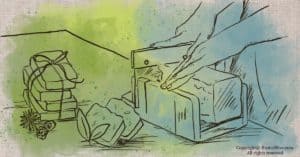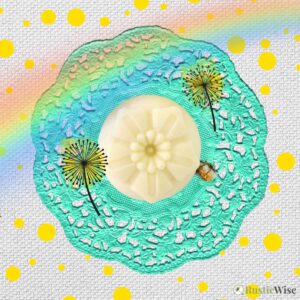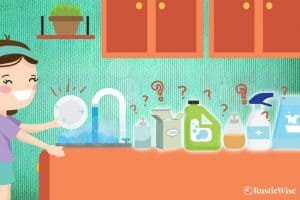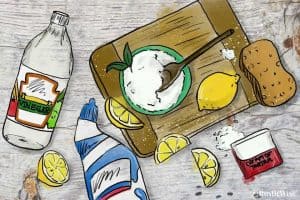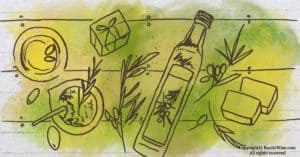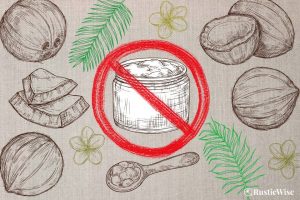How To Use Citric Acid for Cleaning: 7 Easy DIY Recipes
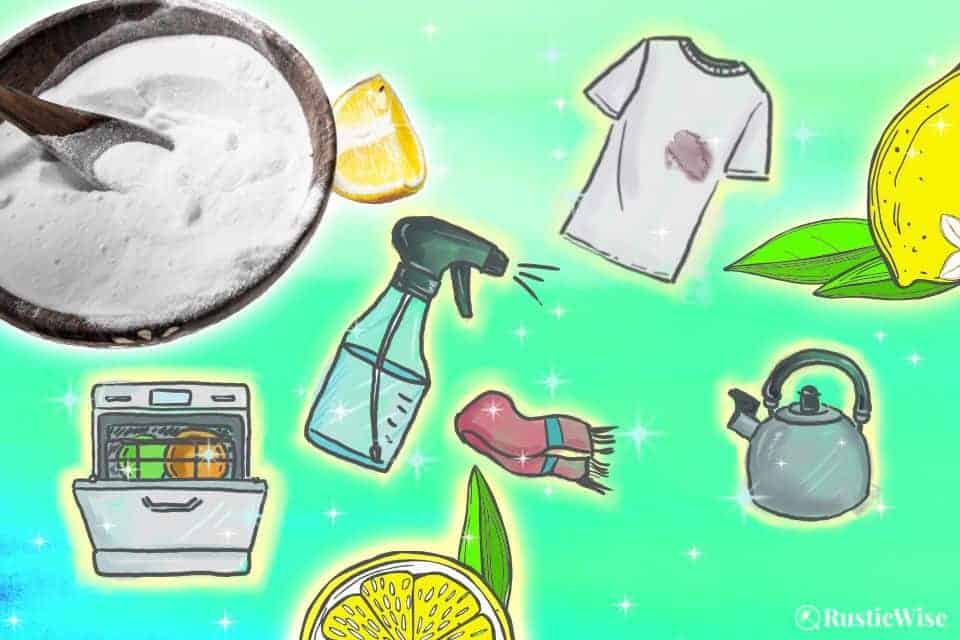
Looking for a natural and cost-effective cleaning solution? Look no further than citric acid. An organic acid found in several fruits, namely lemons, citric acid helps cut through grease and grime, breaks down hard mineral deposits, and removes rust. It’s also antimicrobial too.
If you’re wondering how to use citric acid for cleaning, there are several ways. You can make an all-purpose spray by dissolving 2 tablespoons of citric acid in hot water. Or, you can sprinkle directly onto some surfaces, such as a dirty toilet bowl.
For more details on how to use this lemony-fresh green cleaner, we’ve rounded up 7 easy recipes you can whip up in a few minutes.
Let’s get started!
A closer look at citric acid
Citric acid is a natural compound found in many citrus fruits, including lemons, limes, grapefruits, oranges, and pineapples. Lemon juice contains citric acid, which is what gives it cleaning power to cut through grease and grime.
While citric acid doesn’t exactly have a gentle-sounding name, it’s non-toxic. It has antimicrobial properties which help keep certain bacteria, mold, and mildew at bay.
As it contains many of the same properties as vinegar (another green cleaning powerhouse), it’s often used in similar ways.

As an acidic substance, citric acid has a pH ranging from 3 and 6, making it a weak acid.¹
Have hard water at home? Using citric acid for cleaning helps to remove mineral buildup, especially calcium deposits.
It also acts to remove a range of tough stains, such as tea and coffee stains, and yellowish-brown stains from water.
This natural citrus compound also contains natural disinfectant properties, making it a great choice in many household cleaners.
Tip: When using water-based commercial products that contain citric acid, dry any metal surfaces after cleaning to prevent rust from developing.
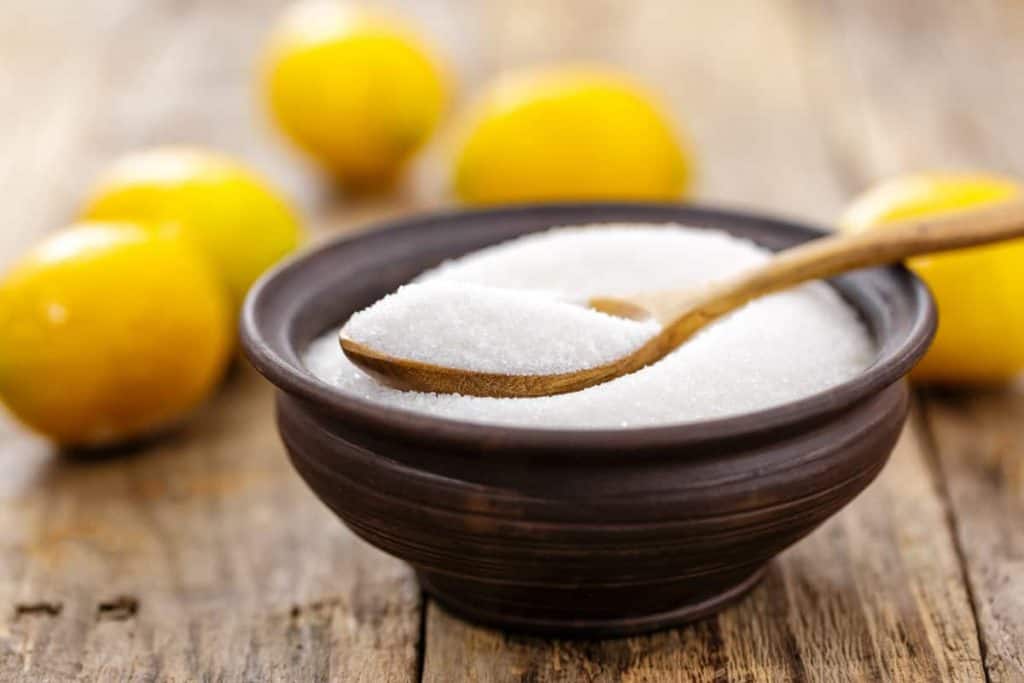
How is citric acid made?
Every year, over 2 million tons of citric acid is produced around the world.²
To churn out this massive amount of citrus powder, manufacturers rely on the fermentation of sugars from molasses and corn starch from the mold Aspergillus niger, commonly known as black mold.²
The many uses of citric acid
Here are a few common citric acid uses:
- Food: In the food industry, you’ll find citric acid used as a pH adjuster, flavor enhancer, and an antioxidant which preserves food. Citric acid also plays a key role in many home canning recipes.
- Personal care products: This citrus acid is used to reduce dark spots and brighten skin. It also works as a pH adjuster.
- Pharmaceuticals: Citric acid is sometimes used as an agent to kill bacteria on the skin.¹
- Commercial cleaning products: Citric acid acts as a chelating agent which binds to metal ions to prevent soap scum from developing. It also acts as a buffer to maintain ideal pH levels.²
- Homemade cleaning products: Powdered citric acid has many practical uses around the home, including descaling coffee makers, polishing appliances, and more. More on how to use citric acid for cleaning in the sections below!
- DIY products: One of the key ingredients in making fizzy bath bombs or shower steamers. Citric acid is sometimes added to cold process soap recipes to banish soap scum.
Why use citric acid to clean?
There are many benefits of using citric acid to clean your home.
It’s natural. It’s non-toxic (especially great if you have young ‘uns or pets running around).
Plus, citric acid works as a disinfectant as it has antimicrobial properties which kill certain harmful bacteria, mildew and pathogenic fungi, as well as some viruses.³
Budget-friendly and widely available at most grocery stores, citric acid is easy on the wallet and the environment.
Most commercial household cleaners contain harsh chemicals which affect your health and do a number on the environment. Using a natural and eco-friendly substance like citric acid helps you cut back on your household’s chemical use.
Citric acid safety
While citric acid is non-toxic and eco-friendly, you should still use the concentrated powder with care.
Citric acid powder may cause serious eye damage or irritation. It can also bring about respiratory irritation, so avoid inhaling the fumes.
What NOT to clean with citric acid
While citric acid is a natural and effective cleaner, it doesn’t play nicely with some materials.
Some silverware or silver-plated items may not fare well when using citric acid in high concentrations (the citrus may remove some detailing).
Avoid using on porous stone countertops, including marble and granite as citric acid may etch the surface.
Keep this citrus substance away from painted or sealed wood surfaces, including sealed hardwood flooring. The citric acid may eat through the finish, creating a cloudy appearance. But, on unfinished wood surfaces (such as wood cutting boards), citrus works just fine.
10 Ways to use citric acid to clean
This citrus powder has many household cleaning uses. How to harness the power of lemons? Let us count the ways:
- Make your own DIY dishwashing detergent (see recipe below).
- Use a slice of lemon plus some coarse salt to clean and deodorize cutting boards. This is especially helpful after cutting meat or fish.
- Sprinkle a bit of powdered citric acid into a dirty toilet bowl. Let it sit 20–30 minutes (or longer if needed). Scrub with a brush. This helps remove hard mineral deposits.
- Clean your bathroom: shower, tub, and sink. Make a general-purpose spray (see recipe below).
- Clean kitchen appliances. Stainless steel appliances like fridge doors can get grimy quickly. Ditto for oven doors and glass stovetops. Give these surfaces a quick wipe down using a citrus spray!
- Descale kettles and coffee pots.
- Remove hard water buildup on stainless steel sinks.
- Polish faucets. Those crusty bits that develop around faucets are no match for lemon power!
- Remove hard water on showerheads. Say goodbye to mineral buildup around showerheads.
- Use as an alternative fabric softener for laundry (works just like vinegar). Add 1 teaspoon of citric acid to the fabric softener compartment of your washing machine.
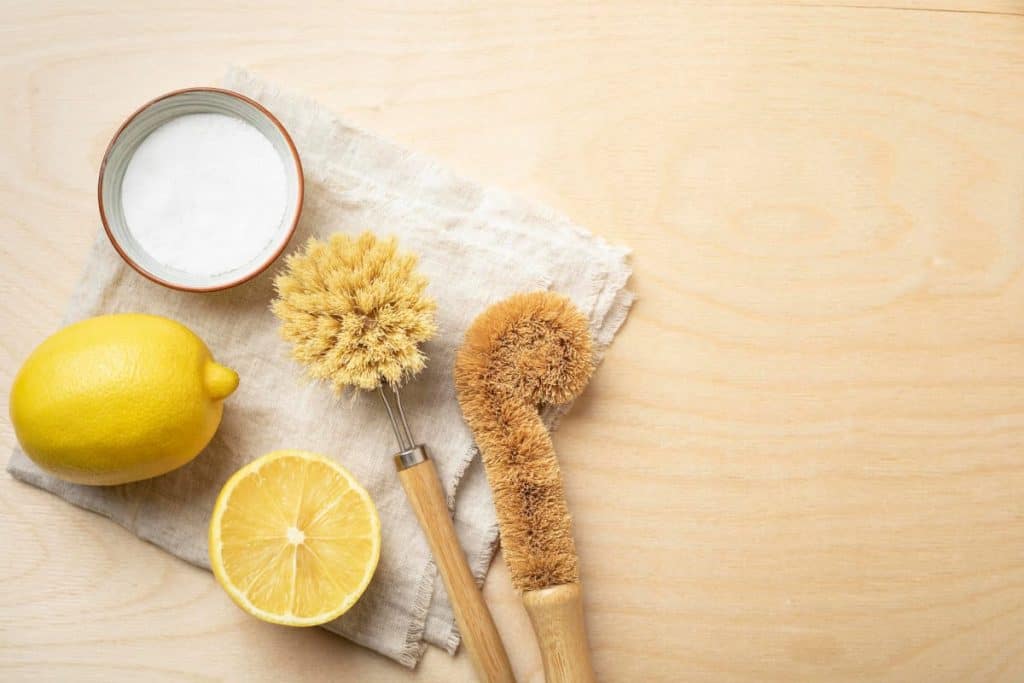
How to use citric acid for cleaning: 7 easy recipes
Looking for citric acid cleaning recipes? Here you go.
1. Basic citric acid all-purpose cleaner
Here’s a multi-purpose homemade citric acid cleaning solution that’s safe to use on many surfaces around the house.
You’ll need:
- 2 tablespoons citric acid powder
- 2 cups hot water
- Optional: a few drops of lemon essential oil, or orange essential oil to boost cleaning and add a citrus-y aroma
- Combine citric acid with hot water in a spray bottle.
- Mix well until crystals have dissolved.
- Add essential oils if desired.
- Swirl to mix. Replace the top and it’s ready to use.
Enjoy your own basic DIY citric acid spray!
2. Toilet cleaner and hard mineral remover
Limescale buildup in toilets is a common occurrence. If this describes your toilet, spruce up your porcelain bowl with a bit of citric acid.
You’ll need:
- 1/2 cup citric acid
- 1 gallon hot water (not boiling as this may crack the toilet bowl)
- Sprinkle citric acid in the bowl where needed. Let it sit for at least 1 hour. For severe mineral buildup, leave overnight.
- Pour hot water in the toilet. Use a brush to gently scrub off hard water deposits.

Credit: Vector State
3. DIY dishwasher detergent
Get sparkling dishes with this easy dishwasher detergent. Store in an airtight container out of reach of young children. The citric acid should also help remove some hard water deposits in your dishwasher—bonus!⁴
You’ll need:
- 1 cup washing soda (sodium carbonate)
- 1 cup baking soda (sodium bicarbonate)
- 1 cup borax
- 1/2 cup citric acid
- 1 cup salt (either Epsom, kosher or rock salt works)
- Airtight container with lid
- Measure out all ingredients and combine well.
- Store your dishwasher detergent in a sealable container out of reach of children. Don’t forget to label it!
To use, scoop the detergent into your dishwasher soap dispenser and run a load. If you have hard water, you can add a bit more citric acid to the mix.
4. Bleach alternative
If you want the disinfecting and brightening properties of bleach minus the chlorine, try this gentler bleach alternative.⁴
You’ll need:
- 1 1/2 cups hydrogen peroxide
- 1/2 cup lemon juice
- 1 tablespoon citric acid
- Clean water to fill a 1 gallon jug
- 1 empty and clean container (1-gallon size)
- Measure and pour hydrogen peroxide, lemon juice, and citric acid into a 1-gallon jug.
- Swirl and mix the ingredients in the jug until all citric acid dissolves.
- Fill the rest of the jug with clean water.
Use as a bleach replacement. Rinse well after using.
5. Wood cleaner
This DIY wood cleaner works to gently remove dirt. The olive oil helps to restore wood’s luster. Remember to only use on unsealed or unpainted wood surfaces, such as wooden cutting boards, for example.⁵
You’ll need:
- 2 tablespoons olive oil
- 2 tablespoons white vinegar
- ¼ cup lemon juice
- A small bowl and spoon to mix with
- Soft cloth
- Combine all ingredients in a small bowl. Mix until well incorporated.
- Apply the wood cleaner to wooden surfaces using a soft, lint-free cloth. Work in the along the grain for best results.
6. Furniture polish
Buff and shine furniture with this natural and gentle furniture polish. Do a small patch test before using on sealed or painted wood surfaces as citric acid may dull some finishes.⁵
You’ll need:
- 1/4 cup melted beeswax
- 1 cup olive oil
- 1 teaspoon lemon juice
- Heat-safe bowl
- Small container
- Wooden spoon
- Soft cloth
- Melt the beeswax in a microwave-safe bowl. Microwave for 30 seconds to 1 minute, then stir for 30 seconds. Keep repeating until wax has liquefied. Avoid overheating!
- Measure and combine the olive oil and lemon juice in a separate container.
- Pour the melted beeswax into the container with the olive oil and lemon juice.
- Use a wooden spoon to stir until well mixed. The mixture thickens when cooled—the finished consistency should be something like peanut butter.
- Apply a small amount onto furniture using a soft cloth. Buff to achieve a soft glow.
7. Brass and copper cleaner
This eco-friendly cleaner gently buffs and cleans brass and copper finishes. Avoid using on lacquered finishes.⁵
This recipe uses equal parts lemon juice, salt, and cornstarch. Adjust as needed!
You’ll need:
- 1 tablespoon lemon juice
- 1 tablespoon salt (non-iodized)
- 1 tablespoon cornstarch
- Small bowl
- 2–3 soft cloths
- Dish soap or Castile soap
- Combine all ingredients in a small bowl to make a paste.
- Apply to the metal using a soft rag. Rub gently.
- Make a soapy solution with some warm water and mild soap. Rinse the surface.
- Wipe dry with a clean, soft cloth.
Where to buy citric acid for cleaning
Citric acid is widely available. Most grocery stores keep it in stock, as well as chain supermarkets like Walmart. You’ll often find it in the canning section.
Or, you can find it in craft stores such as Michael’s.
Citric acid found in local stores often comes in small packages. For the best bang-for-your-buck, shop in bulk. You can find it online on Amazon and other soap making wholesalers.
Related questions
Is citric acid safe to use?
Yes, citric acid is safe to use (just take care to avoid getting into eyes, or breathing in the fumes). The U.S. FDA classifies it as a generally recognized as safe (GRAS) substance. It’s commonly used in food products to preserve and enhance flavors.
If you’re looking to cut down on the amount of chemicals used in your home, citric acid is a great ingredient to add to your cleaning supplies.
When cleaning with citric acid, remember to avoid using it on porous stone surfaces, and unsealed or painted wood surfaces. Apply sparingly when using on silverware.
Which is better for cleaning vinegar or citric acid?
Both vinegar and citric acid are natural, yet effective cleaning ingredients you can use to clean your home, chemical-free!
Vinegar’s cleaning power comes from acetic acid, while citric acid naturally derives from citrus fruits or through a fermentation process.
While both have similar properties and are used in much the same way, citric acid has something that vinegar doesn’t—it acts as a reducing agent. Reducing agents work by unraveling proteins on viruses.⁶
Would you like more timeless tips via email?
Fun tips to help you live an independent, self-sustaining lifestyle. Opt-out at any time.


References
- Chemical Safety Facts, Citric Acid, https://www.chemicalsafetyfacts.org/citric-acid/. Accessed May 2022.
- American Chemical Society, Citric Acid, https://www.acs.org/content/acs/en/molecule-of-the-week/archive/c/citric-acid.html. Accessed May 2022.
- PubChem, Citric Acid, https://pubchem.ncbi.nlm.nih.gov/compound/Citric-acid#section=Uses. Accessed May 2022.
- Washington State University Extension (Snohomish County), Green Cleaning, https://s3.wp.wsu.edu/uploads/sites/2053/2014/10/GreenCleaning-_April-29_2015.pdf. Accessed May 2022.
- University of Georgia and Ft. Valley State University, Green Cleaning–Recipes for a Healthy Home, https://www.fcs.uga.edu/docs/HACE-E-73-1_english_may_2015_recipes.pdf. Accessed May 2022.
- University of Pittsburgh, When Choosing Cleaners it Helps to Know Your Chemistry, https://news.engineering.pitt.edu/when-choosing-cleaners-it-helps-to-know-your-chemistry/. Accessed May 2022.

Author: Theresa Tesolin
Theresa is co-founder of RusticWise. She helps people unleash their inner DIY spirit by encouraging them to get dirty and make or grow something from scratch.


